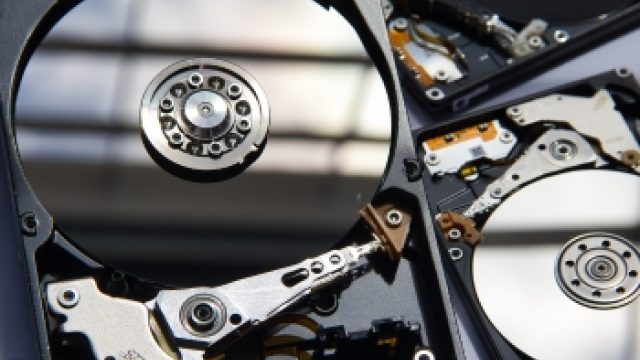When it comes to PC storage, the question of “How Many Hard Drives Can a PC Have” often arises.
In this article, we will delve into the fascinating world of PC storage limits, explore various options to maximize disk space, and provide valuable tips for expanding your PC’s storage capacity.
PC Hard Drive Limits: Beyond the Basics
Modern PCs come with an impressive range of storage capabilities.
Gone are the days of having just one or two hard drives; today’s machines can handle multiple drives, providing a wealth of storage options.
From the sleek and slim laptops to the robust desktop towers, PCs offer flexibility and scalability to meet our ever-growing storage needs.
Counting PC Drive Slots: How Many is Too Many?
The number of hard drives a PC can accommodate depends on its form factor and design.
Desktops typically have more space for drives than laptops due to their larger size.
However, even some compact PCs can surprise you with the number of available drive slots.
When you open up your PC case, you’ll likely find various slots designed to hold hard drives.
These slots are usually located in the front or side of the case, and they come in different sizes to accommodate different drive types.
PC’s Max Drive Capacity: The Sky’s the Limit
The maximum drive capacity a PC can handle depends on its motherboard, BIOS, and operating system.
With advancements in technology, PCs can now support massive amounts of storage space.
Some high-end motherboards even offer support for up to 10 or more drives, giving users an incredible amount of storage potential.
Exploring PC HDD Options: A World of Choices
When it comes to hard drives, you’re spoiled for choice. The most common options include HDDs (Hard Disk Drives) and SSDs (Solid State Drives).
HDDs are the traditional option, providing ample storage at a lower cost, while SSDs offer blazing-fast speeds but often come with a higher price tag.
Hybrid drives, combining HDD and SSD technologies, offer a compromise between speed and storage capacity.
Choosing the right type of drive largely depends on your needs, budget, and intended usage.
Adding More Drives to PC: A Step-by-Step Guide
If you find yourself running out of storage space on your PC, fear not! Adding more drives is a viable solution.
Before you embark on this journey, though, it’s crucial to understand the compatibility of the drives with your system.
Some motherboards may support only specific drive types or have limited slots available.
Once you’ve ensured compatibility, the process of adding more drives is relatively straightforward.
After shutting down your PC and disconnecting the power supply, you can install the new drive into an available slot.
Then, you’ll need to format and initialize the drive in your operating system to make it usable.
Related Article: How to Track a Stolen Laptop with Serial Number: Lost Laptop
Understanding PC Storage: Balancing Speed and Capacity
When managing multiple drives, it’s essential to strike a balance between speed and capacity.
Storing frequently accessed files and applications on faster SSDs can significantly improve your system’s overall performance.
Meanwhile, you can utilize larger HDDs for storing less critical data or files that you don’t access as frequently.
Maximizing PC Disk Space: Tips and Tricks
To make the most of your PC’s storage, consider implementing the following tips:
- Organize Your Files: Keep your files well-organized in appropriate folders to locate them easily.
- Delete Unnecessary Data: Regularly clean up your drives by removing unnecessary files and applications.
- Backup Your Data: Creating backups ensures your valuable data remains safe in case of drive failures.
- Use Cloud Storage: Consider using cloud storage solutions for offloading files and freeing up local disk space.
PC Storage Expansion Tips: Think Ahead
When planning to expand your PC’s storage, it’s essential to think ahead. Consider your future storage needs and invest in a scalable solution.
Opting for a motherboard with more drive slots than you currently need can save you from the hassle of upgrading or replacing it later on.
Drive Limitations & Tips: Overcoming Obstacles
While PCs offer impressive storage capabilities, they do have some limitations. One such limitation is the physical space inside the case.
As you add more drives, the risk of heat buildup increases, potentially affecting performance. Ensuring proper airflow and cooling is crucial to prevent overheating issues.
Additionally, certain PCs, especially pre-built models, may have customized cases that limit the types of drives that can be installed.
In such cases, consulting the manufacturer’s specifications or seeking professional help may be necessary.
Related Article: Micro ATX vs Mini ITX: Choosing the Perfect Form Factor
PC Hard Drive Compatibility: Getting it Right
Ensuring compatibility between your PC and the drives you wish to add is paramount.
Check your motherboard’s specifications to determine which drive interfaces it supports.
SATA and PCIe are the most common interfaces, but newer technologies may be available, offering even faster data transfer speeds.
PC Storage Upgrade Guide: A Journey Worth Taking
Upgrading your PC’s storage is an exciting journey that can breathe new life into your system.
Whether you need more space for work-related files, gaming libraries, or multimedia collections, expanding your storage options will undoubtedly enhance your computing experience.
Managing Multiple Drives: A Tidy Approach
As you accumulate multiple drives in your PC, keeping track of them becomes important.
Assign meaningful drive letters, label them accordingly, and keep a record of which files and data are stored on each drive.
This organized approach will save you from confusion and make data management a breeze.
PC Drive Expansion Ideas: Thinking Outside the Case
If your PC’s case is reaching its drive capacity limit, don’t worry; there are alternatives!
External hard drives, NAS (Network Attached Storage) devices, and cloud-based solutions can all help extend your storage capabilities beyond the confines of your PC’s case.
- FAQs About How Many Hard Drives Can a PC Have
Can a PC have multiple hard drives?
Yes, a PC can have multiple hard drives. Most desktop PCs and some laptops have multiple drive bays or support external hard drives, allowing users to expand storage capacity.
Can I have 3 SSD in my PC?
Yes, you can have 3 SSDs in your PC, provided that your motherboard has enough SATA or M.2 slots.
SSDs are great for fast storage and can improve overall system performance.
How much TB can a PC hold?
The amount of storage a PC can hold depends on the number and capacity of the hard drives it supports.
PCs can hold several terabytes of data or even more with multiple large-capacity hard drives.
Does having multiple hard drives slow down the computer?
Having multiple hard drives does not necessarily slow down the computer. In fact, it can improve performance by distributing the workload and separating the OS from data storage.
Can I have 4 hard drives on my PC?
Yes, you can have 4 hard drives on your PC, depending on the number of drive bays and the motherboard’s support.
This allows for ample storage and organization of data.
What are the benefits of multiple hard drives?
Multiple hard drives offer benefits like increased storage capacity, better organization of data, improved system performance, and the ability to have separate drives for the OS and user data.
Does SSD have a limit?
SSDs have a limited number of write cycles, which means they can wear out over time.
However, modern SSDs have advanced wear leveling and can last for many years under regular use.
How long do SSDs last?
The lifespan of an SSD depends on various factors like usage, drive capacity, and quality.
Generally, consumer-grade SSDs can last anywhere from 3 to 10 years or more with typical use.
How many SSD slots does a PC have?
The number of SSD slots in a PC depends on the motherboard’s design.
Some motherboards have multiple M.2 slots, while others may support additional SSDs via SATA or PCIe.
Do hard drives make the PC faster?
Upgrading to a faster hard drive, such as an SSD, can significantly improve a PC’s speed.
SSDs are faster than traditional HDDs due to their lack of moving parts, resulting in quicker data access times.
Does a bigger hard drive make the computer faster?
A bigger hard drive does not directly make a computer faster.
However, if you upgrade to a larger and faster drive like an SSD, it can improve overall system performance and data access times.
Will replacing my hard drive make my computer faster?
Yes, replacing a traditional HDD with a faster SSD can make your computer much faster.
It will result in quicker boot times, faster application launches, and improved system responsiveness.
What is the best motherboard for multiple hard drives?
The best motherboard for multiple hard drives will depend on the specific needs of the user.
Look for motherboards with ample SATA or M.2 slots and support for RAID configurations.
How many hard drives does Windows 11 support?
Windows 11, like previous versions, supports multiple hard drives.
The number of supported drives is primarily determined by the motherboard and its available connections and slots.
Final Thoughts About How Many Hard Drives Can a PC Have
In conclusion, the number of hard drives a PC can have depends on the motherboard’s design and available drive bays or slots.
Most modern desktop PCs can accommodate multiple hard drives, allowing users to expand storage capacity as needed.
Whether you want to use traditional HDDs or faster SSDs, having multiple drives offers several benefits, such as increased storage, better data organization, and improved system performance.
With the right motherboard and storage configuration, users can build a robust and versatile PC setup tailored to their specific needs, ensuring ample space for data storage, backups, and smooth computing experience.


